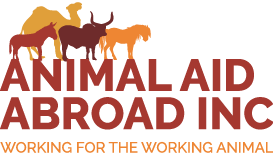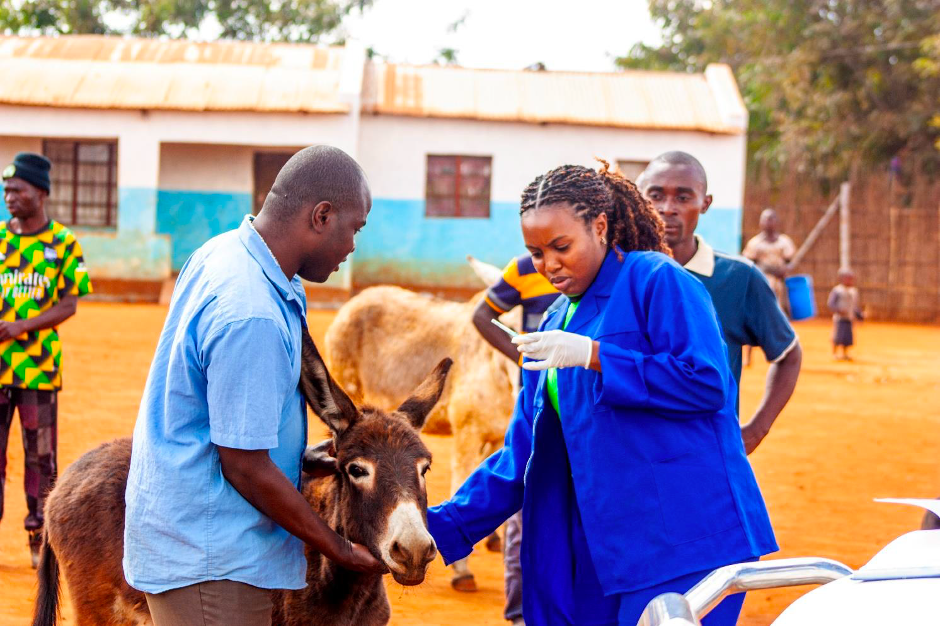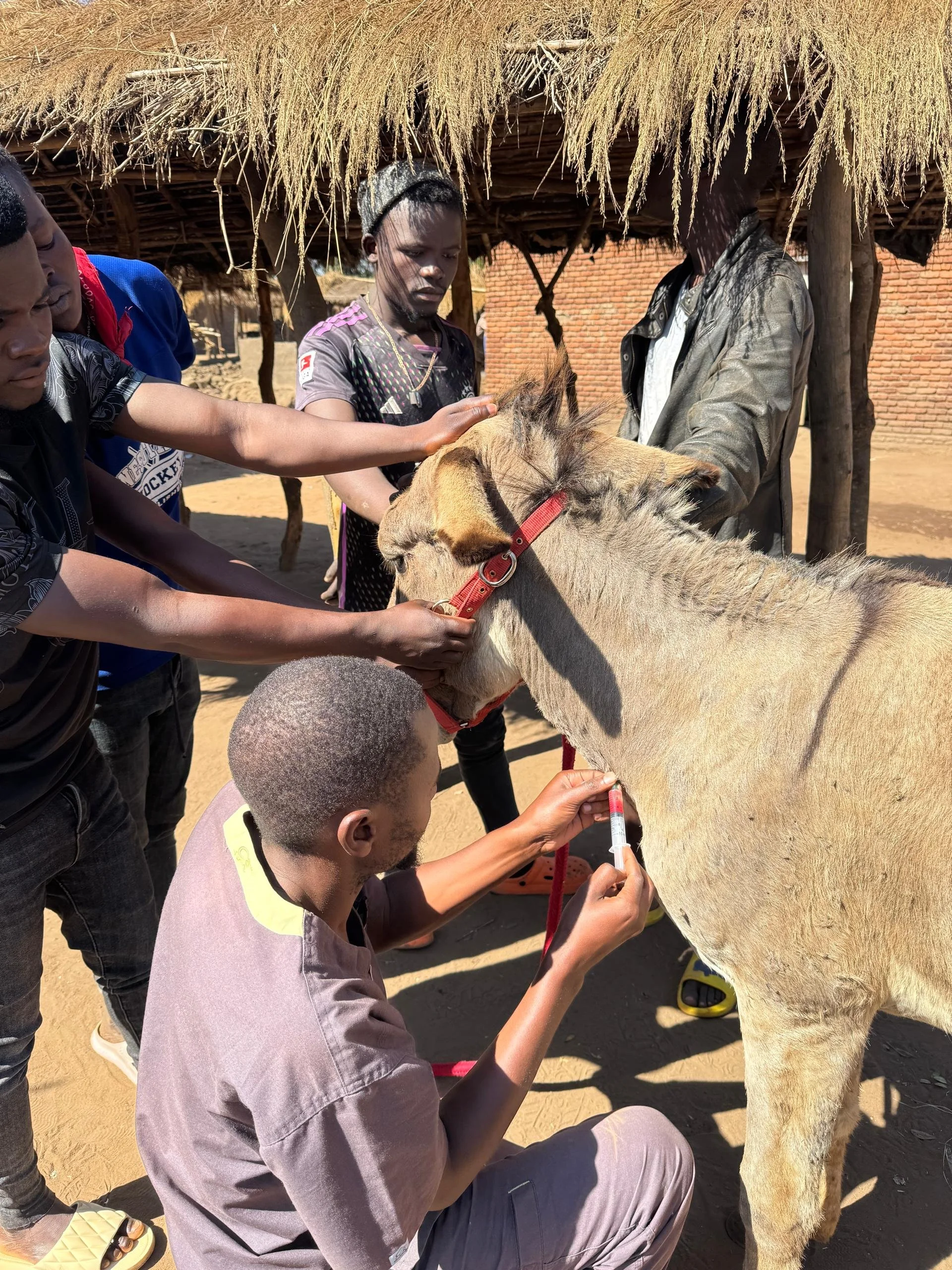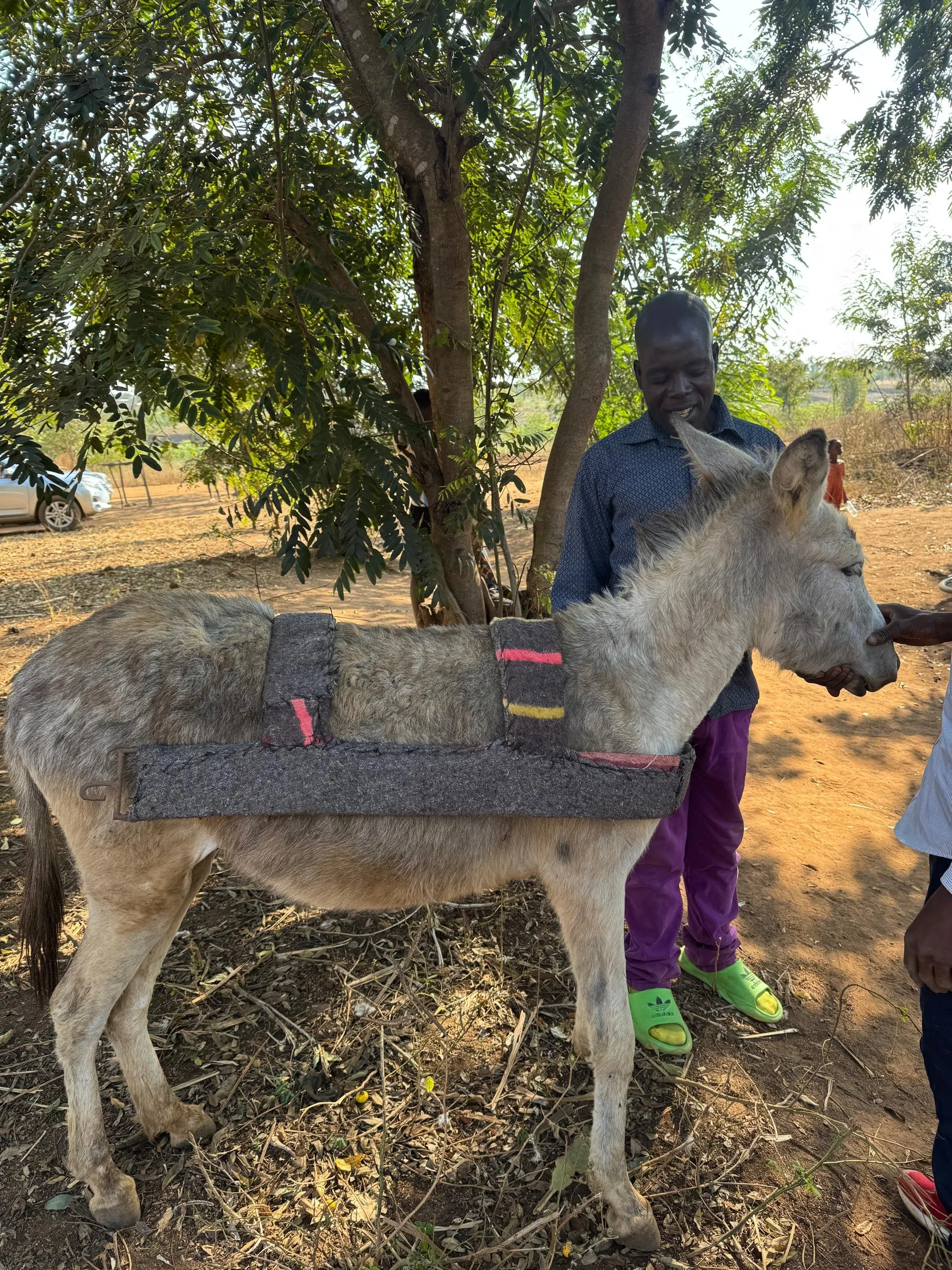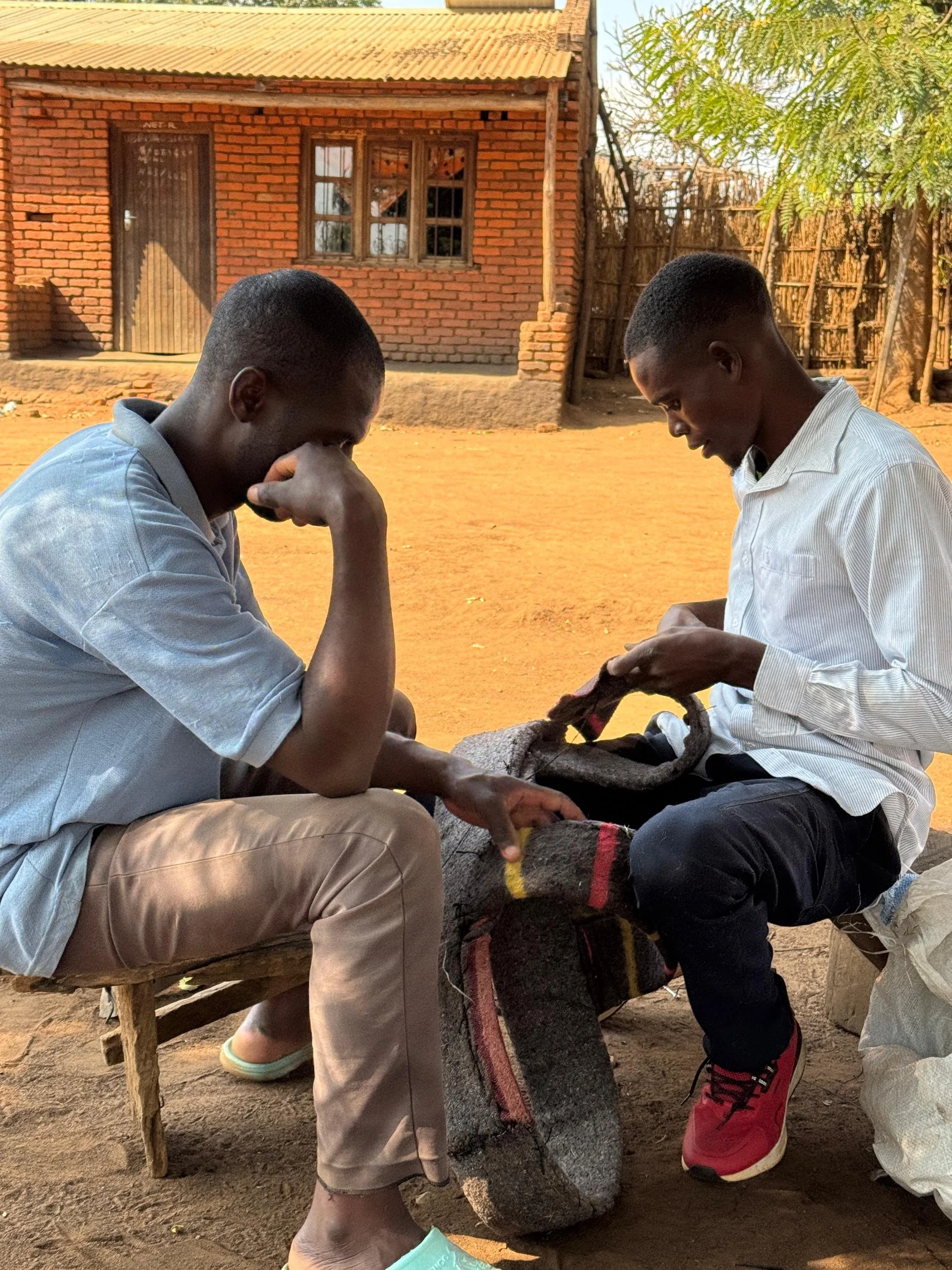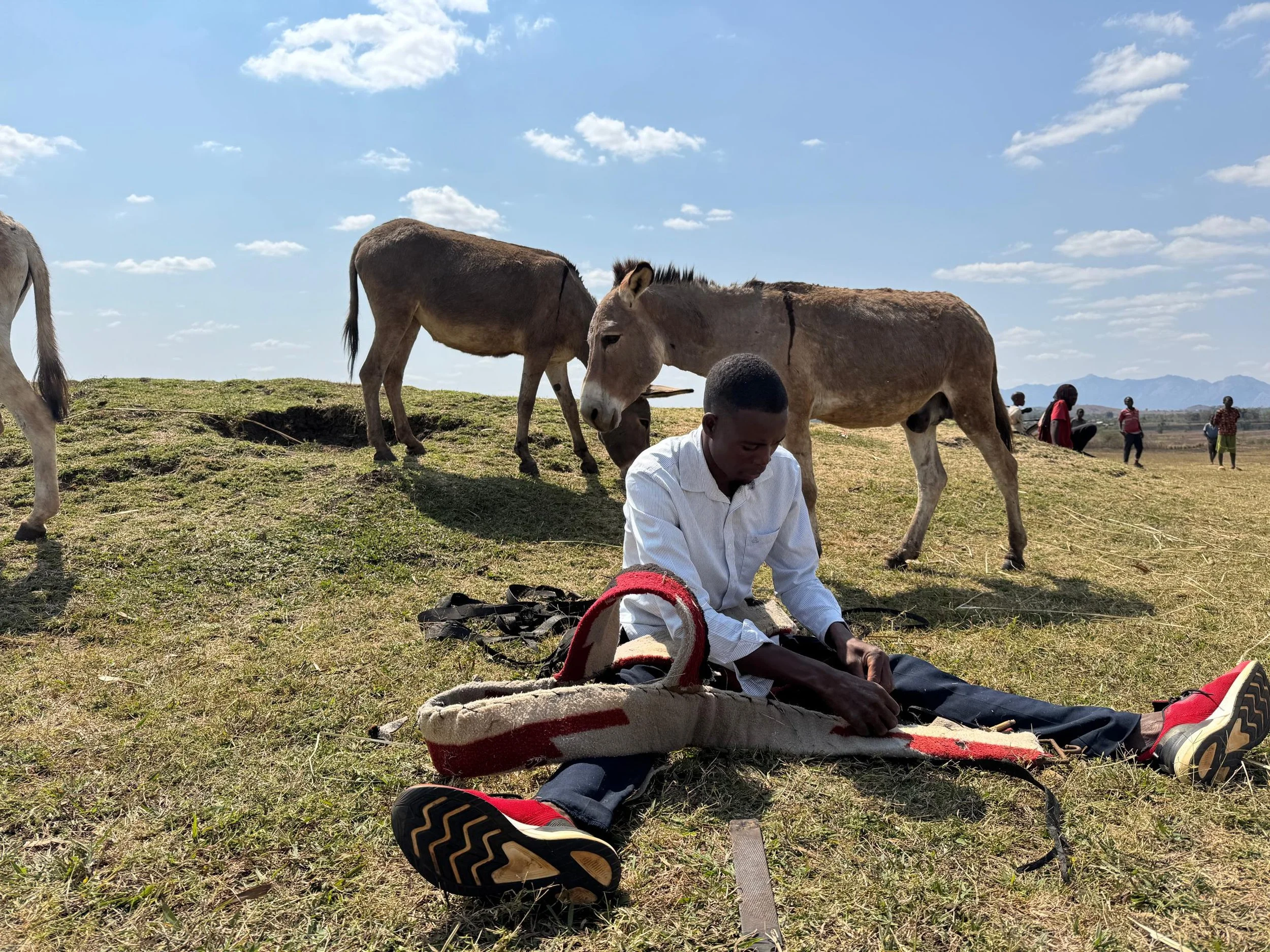Community Engagement Key to Improving Donkey Welfare
Our partner group, Lilongwe Society for the Protection and Care of Animals (LSPCA), provided veterinary care for 220 donkeys in July. They also focused on community education and training, which is essential for improving working donkey welfare. This included a special hands-on training session focused on humane harness repairs and maintenance.
You can read their full July report below:
Introduction
With support from Animal Aid Abroad, the LSPCA team continued fieldwork in Mngwangwa, Tsokomole, and Mitundu throughout July 2025. Activities focused on veterinary care, follow-ups, and community training. Over 220 donkeys were treated for various conditions including wounds, parasitic infections, and poor body condition. Follow-up visits confirmed good recovery for many animals, but also showed the ongoing need for improved rest and better overall care.
Owners received training on humane handling and how to maintain donkey harnesses. Practical demonstrations were supported by local artisans to ensure the skills shared are easy to apply. These efforts are helping communities take better care of their animals in ways that are practical and sustainable.
The team continues to face challenges such as low follow-up attendance, owners working donkeys before they have fully recovered, and failure to recognize signs of dehydration. In response, we are working with local leaders to encourage clinic participation, training artisans to provide harness repair services, and guiding owners to use healthier donkeys while others recover. Community education is ongoing and helps reinforce basic care and monitoring skills.
Donkeys waiting for health check-ups during mobile veterinary clinics.
Veterinary Interventions
On 14th July, the LSPCA team conducted a mobile clinic in Mngwangwa, where 140 donkeys were provided with assessment and treatment. The most common health concerns included bite wounds - often inflicted by other donkeys - cart-related injuries such as harness sores and abrasions, signs of dehydration, and wounds likely caused by whipping or rough handling. Many of the animals also displayed general body weakness, likely due to overwork, poor nutrition, or both.
Each donkey was examined individually. Wounds were cleaned and dressed using appropriate antiseptics, and pain relief was administered where necessary. Donkeys with poor body condition received supportive care, including multivitamin injections and advice to owners on the importance of allowing rest and improving feeding practices. Several donkeys exhibited clinical signs consistent with internal parasitic infestation and were treated with appropriate medications, guided by physical examination findings and owner-reported deworming history.
Throughout the clinic, the team engaged with owners who expressed genuine interest in improving their handling practices. This opened an opportunity to introduce key animal welfare principles and to explain how proper rest, nutrition, and gentle handling can lead to healthier, more productive donkeys.
LSPCA veterinary staff treating a donkey during a mobile clinic.
On 16th July, the LSPCA team responded to an emergency call from the Assistant Veterinary Officer (AVO) in Mngwangwa regarding a donkey in acute distress. The donkey had sustained a scrotal bite injury from another donkey, resulting in exposed testicular tissue and significant pain. Upon clinical examination, immediate field castration was deemed necessary to alleviate suffering and minimize the risk of further complications.
The surgical intervention was carried out successfully on site. Post-operative care included administration of anti-inflammatory medication, prophylactic antibiotics, and initial wound management. The AVO was provided with medication and instructions to continue follow-up treatment. The owner was counselled on essential post-operative care, including proper wound hygiene, monitoring for signs of complications, and the importance of timely reporting.
Subsequent images shared by the AVO revealed purulent discharge at the surgical site, indicating an active infection. The team conducted a follow-up visit to debride the wound, administer further treatment, and reinforce owner training on infection control, wound monitoring, and appropriate response measures to promote healing.
Owners supporting the donkey during post-operative recovery.
On 29th July, the LSPCA team revisited Tsokomole to provide follow-up veterinary care after their initial visit in May. A total of 153 donkeys were attended to during this visit, comprising 53 returning cases and 100 new presentations. Most of the follow-up donkeys had been treated for wounds earlier and exhibited significant healing progress; however, a few cases required additional attention due to continued work despite previous advice to allow adequate rest.
Donkeys recovering from malnutrition and poor body condition showed varied outcomes. Some owners reported noticeable improvements in energy and work capacity, while others had not yet observed significant changes. These follow-up visits offered an important opportunity to reinforce key messages on proper nutrition, adequate rest, and humane handling practices to support recovery.
New cases presented during the clinic included donkeys showing signs of internal parasite infestation, lethargy, and severe weight loss. These animals received appropriate treatment and supportive care to address their conditions. Pregnant donkeys were assessed and found to be in stable condition. In addition, many newly-presented donkeys were generally healthy and required only guidance on preventive care and routine monitoring.
Harness Repairs and Community Engagement
On 1st August, the LSPCA team conducted a hands-on training session in Mitundu focused on harness repairs and maintenance. During the session, nine harnesses were repaired on-site, with the most common issues being worn padding and damaged straps that could cause discomfort or injury to the donkeys. The team showed owners practical ways to repair their harnesses using locally available materials, empowering them to maintain their equipment without needing to purchase new harnesses frequently.
A skilled local artisan, previously trained by LSPCA, led the demonstration. Besides repairing existing harnesses, the artisan also showed how to construct a full harness from scratch. This helped participants understand the proper construction techniques and the importance of a good fit to prevent injuries and improve donkey comfort.
The training attracted many community members who gathered to watch and learn. This created a valuable opportunity to discuss the benefits of using well-maintained harnesses, including reducing wounds and increasing animals’ comfort and work efficiency. Several owners expressed enthusiasm about applying these new skills to improve the welfare of their donkeys.
Donkey owners observing a local artisan repairing a harness during a community training session.
Undertaking harness repairs.
Challenges and Way Forward
Key challenges include low follow-up attendance, economic pressures that lead to overworking injured animals, dehydration, and poor harness quality. These continue to affect donkey health and recovery.
LSPCA is working with local leaders to improve clinic turnout and follow-up participation. Training local artisans has helped owners learn how to maintain their own equipment. Education efforts are ongoing, encouraging early action when animals are unwell and better handling habits.
In the coming weeks, we aim to strengthen our follow-up systems and expand owner training to help improve donkey welfare in the communities we serve.
